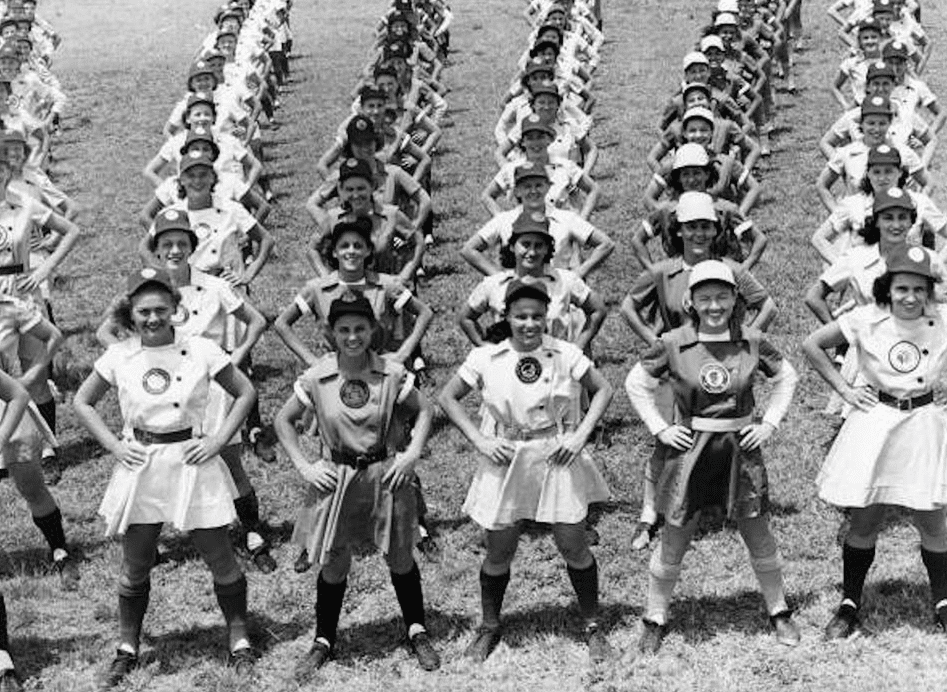The first girl I ever loved was voted “most athletic” during our senior year of high school. She had long blonde hair, blue eyes, and sinewy thighs that glistened when she wore those silky shorts that Richard Simmons popularized in the 1980s. At school, she was on nearly every varsity girls’ team there was and after graduation, the spring we fell in love, she was on the local softball team. And so were a lot of lesbians. They were mostly closeted (except among friends). Some were even closeted to themselves at the time (like one tortured daughter of a preacher who came out much later). But somehow these women found each other in sports.
Years later, many of those women are out, living happy lives. This is also true for the subjects in the 2020 Netflix documentary, A Secret Love. It focused on a 71-year partnership between Pat Henschel and her partner, baseball player Terry Donahue. The latter played with the Peoria Redwings in the All-American Girls Professional Baseball League. The two fell in love during Terry’s last season on the team and have stayed together ever since. Essentially marrying in 1947 (though that wasn’t legal until 2015), the couple stayed closeted for the next 40 years or so. After they came out to family in the 1980s, a relative began filming them.
Women baseball and softball players in the 1940s to the ‘60s underwent overt pressures: be feminine, be white, be straight, be available (but no dating allowed then). The pressure to be feminine and white (or white passing) has continued to be pervasive in pro sports, though the barriers for play are different now. Black, Latina, Indigenous, and other women of color are no longer legally outright barred from play (thank you Title VI). Now, you can find women of all races on different softball teams, many on the LGBTQ+ spectrum. But that doesn’t mean we are exempt from stigma.
In 2010, the Wall Street Journal (as much a bastion of conservatism then as it is today) published a picture of Elena Kagen playing softball with other women. The photo was 17 years old, from her law school days, but the inference was clear: Elena Kagen is a lesbian. The New York Post and dozens of others picked up on the subtextual jab at the woman whom President Obama had just nominated to the U.S. Supreme Court. She was unmarried and accomplished so she was deemed unfeminine—and thus, lesbian by association. (Her friends and the White House put out statements saying she was straight.) The idea that even a woman accomplished enough to join the highest court in the land is judged by her participation in softball reminds us of the stigma surrounding women’s sports and its intersections with sexuality and forced femininity.
Softball has always been a focal point for queer women and so there’s always some truth to that inference the WSJ made—we all understood what those editors were saying with that image. (Pat Griffin’s book, Strong Women, Deep Closets: Lesbians and Homophobia in Sport, is worth a read to understand more.) The public’s reaction to Elena Kagen shows us that masculine appearances are still subject to extra scrutiny and femininity among female athletes is still rewarded. Until she came out, that first girl I loved had hair down to her ass. The first thing she did after coming out was to chop it all off.
Despite public stigma, recreational adult women’s softball teams in the West, in particular, have always been a source of community and relationship-building for queer women. This is especially true in small rural towns like mine (in Idaho) where other LGBTQ+ outlets are nonexistent. And while these aren’t outlets for every gay or bi woman (raising hand as I failed miserably at softball), it is a home to many. And in big cities where there are out queer leagues (like NYC’s Big Apple Sports or Chicago Metropolitan Area Sports Association), women get to live their full lives, on the field and off. That’s the dream of girljocks everywhere.


What Do You Think?